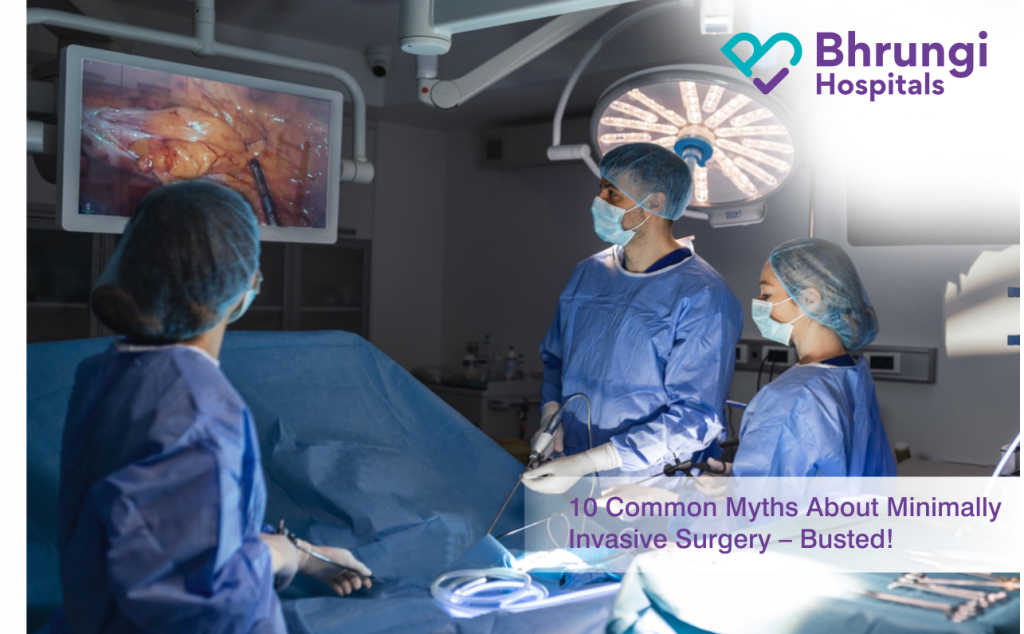
Minimally Invasive Surgery (MIS) has revolutionised the way surgeries are performed. At Bhrungi Hospital, we’re committed to providing our patients with the most advanced and effective treatments, and minimally invasive surgery (MIS) stands at the forefront of this commitment. This innovative approach offers numerous benefits, such as smaller incisions, faster recovery, lesser scars, and reduced pain as compared to traditional open surgery. No wonder that MIS is becoming the preferred choice for many surgical procedures. However, despite its proven advantages and growing popularity, several misconceptions still persist around this advanced surgical technique. In this blog, let’s set the record straight by debunking 10 common myths surrounding minimally invasive surgery.
Myth 1: Minimally invasive surgery is only for simple, minor procedures.
Fact: While MIS was initially adopted for minor surgeries, advancements in technology and surgical techniques have expanded its application significantly, such as complex procedures (gallbladder removal, hernia repair, bariatric surgery, and even certain types of cancer surgeries). Highly complex surgeries across various specialties, including cardiology, urology, gynecology, and orthopedics, are routinely performed using minimally invasive approaches. At Bhrungi Hospital, our skilled surgeons utilize MIS for a wide range of intricate conditions, ensuring optimal outcomes for our patients.
Myth 2: MIS is less effective than open surgery.
Fact: Minimally invasive surgeries are just as effective as traditional open surgeries. In fact, one of the key advantages of MIS is reduced post-operative pain. Smaller incisions translate to less tissue disruption, fewer complications, less scarring, and quicker recovery leading to significantly less discomfort compared to the large incisions required in traditional open surgery. Patients undergoing MIS often require less pain medication and can return to their daily activities sooner.

Myth 3: Recovery time is the same as open surgery.
Fact: This is a major misconception. One of the biggest advantages of MIS is significantly shorter recovery periods. The smaller incisions and reduced tissue trauma mean patients experience less blood loss, less risk of infection, faster healing, less post-operative pain, shorter hospital stays, and quicker return to daily activities compared to open surgery.
Myth 4: It’s a new, untested technique.
Fact: MIS has been around for over three decades and is well-established in the medical community. Techniques like laparoscopy and robotic-assisted surgery are supported by years of research and thousands of successful outcomes.
Myth 5: MIS is more expensive than open surgery.
Fact: While the initial cost may be slightly higher due to the advanced technology and specialized equipment involved, MIS often reduces overall costs by shortening hospital stays, minimising complications, and enabling faster return to work. Considering the overall cost-effectiveness, the long-term savings can outweigh the upfront expense, and MIS often proves to be more economical.
Myth 6: You can’t have MIS if you’ve had previous surgeries.
Fact: Having had prior surgeries does not automatically rule out MIS. In many cases, it can still be performed successfully. Your surgeon will evaluate your medical history, imaging, and overall health to determine the best approach.
Myth 7: MIS is not suitable for elderly patients.
Fact: In many cases, MIS can be particularly beneficial for elderly patients who may have other underlying health conditions. The reduced physiological stress associated with MIS, including less blood loss and faster recovery, makes it a safer and more tolerable option for older individuals.

Myth 8: Robotic surgery means a robot is performing the operation.
Fact: Robotic surgery is an advanced form of minimally invasive surgery that uses robotic tool controlled by the surgeon, and not an independent operator, to operate through the small incisions. The surgeon uses a console to guide the robotic arms with precision and flexibility that enhances their skill.

Myth 9: MIS always leaves visible scars.
Fact: While any surgical procedure will leave some form of mark, the scars from MIS are significantly smaller and less noticeable than those from traditional surgery. Often, these incisions are only a few millimeters in length. With proper care, they often fade over time.
Myth 10: MIS is riskier than open surgery.
Fact: When performed by experienced and skilled surgeons, MIS is generally considered as safe as, if not safer than, traditional open surgery. The smaller incisions reduce the risk of infection, blood loss, and other complications associated with large incisions. At Bhrungi Hospital, our surgical teams are highly trained in advanced MIS techniques, ensuring the highest standards of patient safety.
Conclusion
We hope this has clarified some of the common misconceptions surrounding minimally invasive surgery. At Bhrungi Hospital, we are dedicated to providing our patients with the most advanced and effective surgical options. If you have any questions about minimally invasive surgery and whether it’s the right choice for you, we encourage you to schedule a consultation with one of our expert surgeons.
Bhrungi Hospital- Providing you Comprehensive and Coordinated Care That You Deserve
With a focus on holistic recovery, Bhrungi Hospital stands as a leader in high-quality emergency and critical care services in a patient-centered setting. Our integrated approach combines expertise, advanced technology, and compassionate care, focusing on safety and transparency while remaining affordable and accessible to all patients in need.
- ACLS Ambulance with free service within 10KMs radius
- Ventilator Ambulance service available
- Call +91 7845 108 108 anytime, any day
- 100+Beds Multispecialty Hospital
- 24×7 Emergency Care








